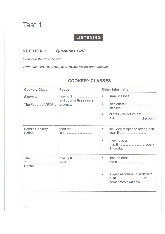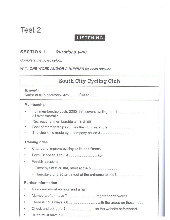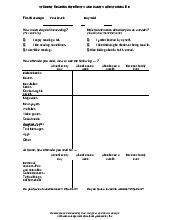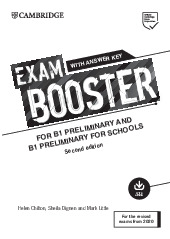
New
media
Starting off
0 Work
in
pairs.
Look
at
the
photos of different media.
Which
do
you
normally
use
to do
the
following?
• keep
up
to date
with
the
news
• do research for
your
work or studies
• relax
wh
en
you're alone
• keep up
with
th
e latest ideas
and
fashions
• enjoy yourself
with
friends
Reading Section 1
0 Work
in
small
groups.
You
are
going to read a
passage
about
the
World Wide Web. Before you read,
discuss
these
questions.
1 How is tbe World Wide Web different from the Internet?
2 How do you
pe
r
sona
lly
use
the Web?
6
Now
read
the
passage
on
page
38
quite
quickly.
How
many
uses
of
the
Web
are
mentioned?
zoo
The
many guises
of
our most successful theo
ry
E.T.
DEnCTOR
If there
are
aliens
tl!is
wur
find them
TURN Df'F PAIN
Is
The
sw
itch
lnlhe
brain
New media @

'
Information
Management:
A
Proposal'
.
That
was
the
bland
title
of
a
document
written
in
March
1989
by
a
then
little-
known
computer
scientist
called
Tim
Berners-Lee,
who
was
working
at
CERN,
Europe's
pa
r
ticle
physics
laboratory,
near
Geneva
.
His
proposa
l,
modestly
called
the
World
Wide
Web
,
has
achieved
far
more
than
anyone
expected
at
the
time.
In
fact
,
the
Web
was
invented
to
deal
with
a
specific
problem
.
In
the
late
1980s,
CERN
was
planning
one
of
the
most
ambitious
scientific
projects
ever
,
the
Large
Hadron
Collider•
,
or
L
HC
.
As
the
first
few
lines
of
the
original
proposal
put
i
t,
'
Many
of
the
discussions
of
the
future
at
CERN
and
the
LHC
end
with
t
he
question
"
Yes
, but
how
will
we
ever
keep
track
of
such
a
large
project?
"
This
proposal
provides
an
answer
to
such
questions.'
The
Web
,
as
everyone
now
knows
,
has
many
more
uses
than
the
original
idea
of
linking
electronic
documents
about
particle
physics
in
laboratories
around
the
world
.
But
among
all
t
he
changes
it
has
brought
about,
from
personal
social
netwo
r
ks
to
political
campaigning,
it
has
also
transformed
the
business
of
doing
science
i
tself,
as
the
man
who
invented
it
hoped
it
would.
It
a
ll
ows
journals
to
be
published
online
and
links
to
be
made
from
one
paper
to
another.
It
also
permits
professional
scientists
to
recru
it
thousands
of
amateurs
to
give
them
a
hand.
One
project
of
this
type
,
called
GalaxyZoo
,
used
these
unpaid
workers
to
classify
one
mill
i
on
i
mages
of
galaxies
into
various
types
(spiral,
elliptical
and
irregular)
.
This
project
,
which
was
intended
to
help
astro
n
omers
understand
how
galax
i
es
evolve
,
was
so
successful
that
a
successo
r
has
now
been
launched
,
to
classify
the
brightest
quarter
of
a
million
of
them
in
finer
detail.
People
working
for
a
more
modest
project
called
Herbaria@home
examine
scanned
images
of
handwritten
notes
abou
t
old
plants
stored
in
British
museums.
This
will
allow
th
em
to
track
the
changes
in
the
distribution
of
species
in
response
to
climate
change.
Another
new
scient
ifi
c
application
of
the
Web
is
to
use
it
as
an
experimental
laboratory
.
It
is
allowing
social
scientists,
in
particular
,
to
do
th
i
ngs
that
were
previously
impossible.
In
one
project,
scient
i
sts
made
observations
about
the
sizes
of
human
social
networks
using
data
from
Facebook
. A
second
investigation
of
t
hese
networks,
produced
by
Bernardo
Huberman
of
HP
Labs,
Hewlett-Packard's
research
arm
in
Palo
Alto
,
California,
looked
at
Twitter
, a
soc
i
al
networking
website
that
allows
people
to
post
short
messages
to
long
lists
of
frie
n
ds.
@
Unit4
At
first
glance
,
the
networks
seemed
enormous-
the
300
,
000
Twitterers
sampled
had
80
friends
each
,
on
average
(t
hose
on
Facebook
had
120),
but
some
listed
up
to
1,
000
.
Closer
statistical
inspection
,
however,
revealed
that
the
majority
of
the
messages
were
directed
at
a f
ew
specific
friends.
This
showed
that
an
ind
iv
idual
's
active
social
network
is
far
smaller
than
his
'
clan'
.
Dr
Huberman
has
also
helped
uncover
several
laws
of
web
surfing,
including
the
number
of
times
an
average
person
will
go
from
web
page
to
web
page
on
a
given
site
before
giving
up,
and
the
details
of
the
'winner
takes
all'
phenomenon
,
whereby
a
few
sites
on
a
given
subject
attract
most
of
the
attention,
and
the
rest
get
very
little.
Scientists
have
been
good
at
using
the
Web
to
carry
out
research
.
However
,
they
have
not
been
so
effective
at
employing
the
latest
web-based
social-networking
tools
to
open
up
scientific
discussion
and
encourage
more
effective
collaboration
.
Journal
i
sts
are
now
used
to
having
their
art
i
cles
commented
on
by
dozens
of
readers
.
Indeed
,
many
bl
oggers
develop
and
refine
their
essays
as
a
result
of
these
comments
.
Yet
although
people
have
tried
to
have
scientific
research
reviewed
in
the
same
way,
most
researchers
only
accept
reviews
from
a
few
anonymous
experts.
When
Nature
,
one
of
the
world's
most
respected
scientific
journals,
experimented
with
open
peer
review
in
2006
,
the
results
were
disappointing
.
Only
5%
of
the
authors
it
spoke
to
agreed
to
have
their
article
posted
for
review
on
the
Web
-
and
their
instinct
turned
out
to
be
right
,
because
almost
half
of
the
papers
attracted
no
comments.
Michael
Nielsen
,
an
expert
on
quant
um
computers,
belong
s
to
a
new
wave
of
scientist
bloggers
who
want
to
change
this.
He
thinks
the
reason
for
the
lack
of
comments
is
that
potential
reviewers
lack
incentive.
adapted
from
The
Economist
*The
Large
Hadron
Collider
(LHC)
is
the
world
's
largest
particle
acce
l
erator
and
collides
particle
beams
.
It
pro
vides
information
on
f
und
a
mental
questions
of
phy
si
cs.

8 Read Questions
1-6
below,
underline
the
key
words
in
the
statements,
then
use
these
to
find
the
right
place
in
the
passage.
0 Now
read
those
sections of
the
passage
ca
refully
to decide
if
the
statements
are
true,
false
or
not
given.
Questions
1-6
Do
the
following statements agree
with
the
information given
in
the
reading passage?
Write
TRUE
FALSE
if
the statement agrees with the
information
if
the statement contradicts the
information
NOT GIVEN
if
there is no information
on
this
1
Tim
Berners-Lee
was
famous for his research
in
physics before
he
invented
the
World
Wide Web.
2
The
original intention of
the
Web
was
to
help
manage
one
extremely complex project.
3
Tim
Berners-Lee
has
also
been
active
in
politics.
4
The
Web
has
allowed professional
and
amateur
scientists to work together.
5
The
second
galaxy project
aims
to
examine
more galaxies
than
the
first.
6 Herbaria@home's
work
will help to reduce
the effects of climate change.
Exam advice
True
1 False I
Not
Given
•
Find
words in the passage that are the same
as
or
similar
to
words in the statement.
• Quickly find the part
of
the passage that deals
with each statement;
you
will
be
able to find
this, even when
an
answer
is
Not
Given.
0 Work
in
pairs.
Look
at
Questions 7-10
in
the
next
column.
1 Read
the
title of
the
notes
and
find
the
section of
the passage
which
deals
with
this.
2 Read Questions
7-10
and
decide
what
type of
information you
need
for each gap.
3 Read
relevant section of the passage
ca
refully
and
answer
Questions 7-10.
Questions 7-10
Complete the notes below.
Choose
NO MORE
THAN
TWO
WORDS from the
passage
for
each answer.
We.b
use.d b)' Soc..al
SGoe.V1+.s+s
CV1c.IUdol'1j
Dr"
llube.Y"mal'1)
+o
'"'ve.s+,ja
+e.
+t,e.
1
..
.
of
Soc.,al
V1e.+WoY"kS
.
Mos+ 8 ......... .
'"'+e.V1de.d
for"
l,m,+e.d
V1Umbe.Y"
of
people. -
Vlo+
e..Ve..Y"jo"'e..
oV1
l,s+
.
Dr"
llube.Y"mal'1
i.-.QS
also
9
..
...
...
..
+o
d.sc.oVe.Y"
koW
lo"'j
people. w,ll
spe."'d
ol'1
a
pa,.,+.c.ular"
we.bs,+e.;
wry
a Small
V1Umbe.Y"
of
s.+e.s
3e.+
muc.L-.
moY"e..
10
.
......
.
+L-.a"'
o+ke.Y"S
oV1
Same.
+.
Exam advice Note completion
Read
the title
of
the notes and find the section
of
the passage which deals with the subject.
Read
the notes and decide what type
of
information you need for each gap.
Be
careful to copy the answer from the passage
exactly.
(i)
Look
at
Questions 11-13 below.
1 Underline
the
key idea
in
each ques
tion
and
find
the
part
of
the
passage
which
deals with it.
2 Read
the
passage
and
underline
the
words you
need
to
answer
the questions,
then
copy
the
answers
carefully.
3
Check
that
your
answer
gives
th
e correct
information, e.g. for Question
11
your
answer
should
be
a
name
(Whose writing ...
?)
.
Questions 11-13
Answer the questions below.
Choose
NO MORE
THAN
TWO
WORDS from the
passage
for
each answer.
11
Whose
writing
improves as a result of
feedback received from readers?
12
What
type
of
writing
is not reviewed
extensively
on
the Web?
13
Which
publicat
io
n invited authors to publish
their articles on
the
World Wide Web?
New
media @
NOT GIVEN
TRUE
NOT GIVEN
TRUE
FALSE
FALSE
sizes
messages
attention
law
bloggers
scientific researchs
Nature
FALSE
NOT
GIVEN
fewer not more
web surfing
Bấm Tải xuống để xem toàn bộ.
Preview text:
sizes messages law web surfing attention NOT GIVEN FALSE TRUE NOT GIVEN TRUE FALSE fewer not more FALSE NOT GIVEN bloggers scientific researchs Nature




